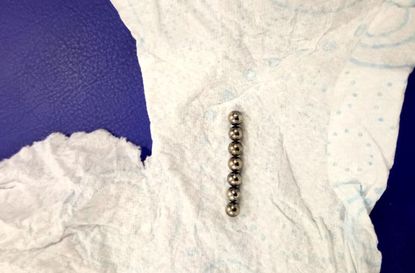'The next child may not be so lucky' Doctor issues warning over 'fake piercing craze' that nearly killed 12-year-old boy
She says children need to be made aware of the 'life-threatening risks' of the craze


A doctor has issued a warning over a new 'fake piercing craze' that almost killed a 12-year-old boy.
The trend is becoming popular among youngsters who use ball-bearing magnets to mimic tongue and cheek piercings.
Unlike a real piercing, where the skin has to be punctured, the craze sees teenagers trying to make the ball-bearing magnets stick to each other.
However, if swallowed, the magnets can cause serious damage by burrowing into the stomach and intestines, potentially causing bowel perforation or intestinal blockage.
After a series of cases that required medical attention, a surgeon issued a warning to make everyone aware of the dangers children are putting themselves in by taking part in the craze.

Image: Hull and East Yorkshire Hospitals NHS Trust
Dr Sanja Besarovic is warning parents and schools to make children aware of the dangers of the 'fake piercing craze'
GoodtoKnow Newsletter
Parenting advice, hot topics, best buys and family finance tips delivered straight to your inbox.
Dr Sanja Besarovic, who works as a consultant paediatric surgeon at Hull Royal Infirmary, spoke out after treating three different children who had ingested the 3mm diameter balls because of the 'fake piercing craze'.
All three youngsters had to undergo life-saving operations, like 12-year-old Freddie Webster, who had a part of his bowel removed after trying to mimic a cheek piercing and almost died.
In a letter to the Royal Society for the Prevention of Accidents, Ms Besarovic wrote: 'I am concerned about the growing incidence of this problem.
'Parents and schools should be aware of this craze so they can warn children of the life-threatening risks especially if swallowed at different times.
'Most of children are asymptomatic and first symptoms like abdominal pain, nausea, vomiting develop only after damage had been done.'
She adds that even though no one has died as result of the craze yet, cases could become increasingly more serious if children aren't made aware of the risks.
'We have been able to save these children but I'm growing increasingly concerned that this is happening more often.
'Both of the children recovered well after surgery but the next child may not be so lucky.'
Trusted, informative, and empathetic – GoodToKnow is the ultimate online destination for mums. Established in 2007, our 15-year-strong archive of content includes more than 18,000 articles, 1,500 how-to videos, and 7,000 recipes.
-
 Heard of the '9-minute theory'? Find out how to use with kids of all ages (it might help ease the 'mum guilt' that creeps in)
Heard of the '9-minute theory'? Find out how to use with kids of all ages (it might help ease the 'mum guilt' that creeps in)The 9-minute theory has sparked a lot of conversation online, as mums share how it makes their day easier and improves relationships with their children.
By Lucy Wigley Published
-
 Most popular Tonies ever: 11 bestsellers, plus one we predict will be huge
Most popular Tonies ever: 11 bestsellers, plus one we predict will be hugeFrom Igglepiggle to Encanto, these are the bestselling Tonies to help kickstart an epic audio character collection
By Sarah Handley Published